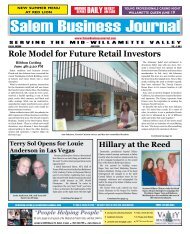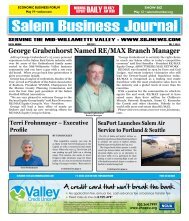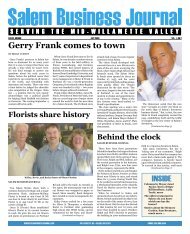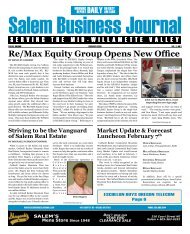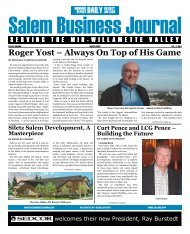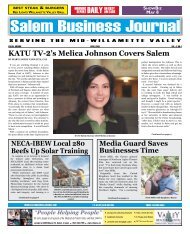willamette heritage center And The venerable Gerry Frank - Salem ...
willamette heritage center And The venerable Gerry Frank - Salem ...
willamette heritage center And The venerable Gerry Frank - Salem ...
Create successful ePaper yourself
Turn your PDF publications into a flip-book with our unique Google optimized e-Paper software.
April 2013 <strong>Salem</strong> Business Journal page 9<br />
Putting Your Mortgage In Reverse<br />
It used to be that you knew a<br />
television or movie star was in<br />
the twilight of their career when<br />
they appeared on a game show.<br />
Now it appears that reality TV and<br />
infomercials are the sign. Ok, so<br />
that may be rude and I am sure<br />
Robert Wagner, Pat Boone, and<br />
Barbara Eden could get an acting<br />
gig if they wanted to. But now even<br />
former Senator Fred Thompson is<br />
getting into the act! <strong>The</strong>re is rarely a<br />
connection to the spokesperson and<br />
the product, and these companies<br />
know that folks don’t buy from<br />
experts they buy from someone<br />
with a perceived solid character<br />
with a comforting and sincere voice.<br />
To listen to these actors tell it, a<br />
Reverse Mortgage (RM) is the ticket<br />
you need to “live the lifestyle you<br />
deserve in your declining years”. It<br />
should however be a caution to make<br />
a major financial decision from the<br />
advice from a person getting paid to<br />
say a few words.<br />
Lately this advisor has been receiving<br />
Reverse Mortgage information in the<br />
mail and it seems like these products run<br />
in cycles as do the benefits of annuities<br />
during anxious times. In this article we<br />
will explore what Reverse Mortgages are,<br />
how they work, and who they are meant<br />
for. Originally Reverse Mortgages were<br />
designed for seniors (with few assets and/<br />
or cash flow) who wished to remain in<br />
their homes until death. Since the first RM<br />
was taken out in 1961 the original intent,<br />
as well as the average number of loans<br />
have changed considerably. A good thing<br />
about the growth in loans is that fees and<br />
the interest rate charges should begin to<br />
come down, as historically they have been<br />
very high compared to other mortgage<br />
alternatives.<br />
<strong>The</strong> RM is aptly named in that the lender<br />
makes payments to you, the borrower, the<br />
borrower does not make payments or pay<br />
the lump sum back until a triggering event.<br />
Those triggering events for the borrower<br />
can be: death, sale of the house, failure to<br />
live in the house for over 12 months, and/<br />
or failure to keep up with property tax and<br />
insurance payments. So, while the home<br />
owner does not have to make payments<br />
over the term of the loan, the balance or<br />
debt increases and the equity decreases.<br />
<strong>The</strong>re are three basic RM products<br />
available: the Home Equity Conversion<br />
Mortgage (HECM) which is the most<br />
common product from the Federal Housing<br />
Administration; the Fannie Mae Home<br />
Keeper; and products offered by private<br />
institutions that will loan on higher valued<br />
properties. <strong>The</strong> way in which the borrower<br />
may receive the money will vary on their<br />
Let’s Talk W. Ray Sagner CFP (R)<br />
needs. One can take the proceeds in a<br />
lump-sum, a monthly payment, in a line of<br />
credit, or in a combination of the previously<br />
listed methods.<br />
While the strategy can be a good one it<br />
is not for everyone and there are a couple<br />
of drawbacks. <strong>The</strong> fees and interest rate<br />
are high relative to conventional mortgage<br />
financing. <strong>The</strong> set-up cost for an HECM can<br />
be 5% of the loan balance and the interest<br />
rate (which is tied to the one year treasury)<br />
may be significantly higher than that of<br />
a regular mortgage. Not only may the<br />
interest rate be higher but it is compounded<br />
over the period of the loan which could be<br />
a big drawback over a long period of time.<br />
Another drawback for many can be the loan<br />
amount. <strong>The</strong> amount a home owner can<br />
borrow can depend on how old the borrower<br />
is, interest rates, and the appraised value of<br />
the home, for which there is a maximum<br />
determined by the average home price in<br />
your area. Considering the maximum loan<br />
amount, a home owner may end up with<br />
To qualify for a RM the<br />
home owner(s) must be 62<br />
years or older, and own the<br />
property and it must be their<br />
primary residence.<br />
considerably less than the actual value.<br />
Even with a private lender; the amount may<br />
end up being only 35% or less of the value.<br />
While the average may be higher than the<br />
35% mentioned the home owner needs to<br />
have substantial equity in the home.<br />
To qualify for a RM the home owner(s)<br />
must be 62 years or older, and own the<br />
property and it must be their primary<br />
residence. <strong>And</strong> considering the complexity<br />
of these types of loans, borrowers are<br />
required to meet with an approved<br />
HECM counselor<br />
to make sure they<br />
understand the<br />
loan. Regarding the age of the borrowers,<br />
if one spouse is considerably younger<br />
than the other, it is a good idea to review<br />
ownership options. Since the amount of<br />
the loan is in part based on the age of the<br />
borrowers there are strategies to change<br />
title and protect the younger spouse while<br />
maximizing the loan amount.<br />
While a Reverse Mortgage can be a good<br />
tool for the correct situation and for the<br />
right person, they should not be considered<br />
to be a vehicle to “the life style you should be<br />
living”. Along with any financial planning<br />
strategy, the RM should be considered with<br />
care, discussed with your advisors, and<br />
compared with the alternatives.<br />
<strong>The</strong> purpose of this article is to inform our<br />
readers about financial planning/life issues.<br />
It is not intended, nor should it be used, as<br />
a substitute for specific legal, accounting,<br />
or financial advice. As advice in these<br />
disciplines may only be given in response<br />
to inquiries regarding particular situations<br />
from a trained professional. Ray Sagner is<br />
a Certified Financial Planner with <strong>The</strong><br />
Legacy Group, Ltd, a fee only Registered<br />
Investment Advisory Firm, in <strong>Salem</strong>. Ray<br />
can be contacted at 503-581-6020, or<br />
by email at Ray@<strong>The</strong>LegacyGroup.com<br />
You may view the Company’s web site at<br />
<strong>The</strong>LegacyGroup.com



